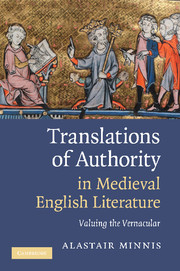Book contents
- Frontmatter
- Contents
- Preface
- List of abbreviations
- Introduction: valuing the vernacular
- Chapter 1 Absent glosses: the trouble with Middle English hermeneutics
- Chapter 2 Looking for a sign: the quest for Nominalism in Ricardian poetry
- Chapter 3 Piers's protean pardon: Langland on the letter and spirit of indulgences
- Chapter 4 Making bodies: confection and conception in Walter Brut's vernacular theology
- Chapter 5 Spiritualizing marriage: Margery Kempe's allegories of female authority
- Chapter 6 Chaucer and the relics of vernacular religion
- Notes
- Bibliography
- Index
Chapter 3 - Piers's protean pardon: Langland on the letter and spirit of indulgences
Published online by Cambridge University Press: 30 June 2009
- Frontmatter
- Contents
- Preface
- List of abbreviations
- Introduction: valuing the vernacular
- Chapter 1 Absent glosses: the trouble with Middle English hermeneutics
- Chapter 2 Looking for a sign: the quest for Nominalism in Ricardian poetry
- Chapter 3 Piers's protean pardon: Langland on the letter and spirit of indulgences
- Chapter 4 Making bodies: confection and conception in Walter Brut's vernacular theology
- Chapter 5 Spiritualizing marriage: Margery Kempe's allegories of female authority
- Chapter 6 Chaucer and the relics of vernacular religion
- Notes
- Bibliography
- Index
Summary
In May 1377 Catherine of Siena enthusiastically urged a visitor to Rome – quite the best place on earth for indulgences – to ‘Bathe, bathe in the blood of Christ crucified! Go on lapping up the blood of Christ crucified through these pardons (perdoni). For when people go to the pardons they are doing nothing less than harvesting the blood, since the pardon is granted us because of the blood of the spotless Lamb.’ Christ was the main contributor to a vast thesaurus mysticus, filled superabundantly with His own merits and those of His Saints, which made such pardoning possible. Clement VI's bull Unigenitus (1343), wherein the idea was promulgated as dogma, had declared that ‘Christ shed of His blood not merely a drop, though this would have sufficed… to redeem the whole human race, but a copious torrent’, thereby ‘laying up an infinite treasure for mankind’. This treasure was ‘entrusted to Blessed Peter, the key-bearer, and his successors, that they might, for just and reasonable causes, distribute it to the faithful in full or in partial remission of the temporal punishment due to sin’. Powerful words, which express well the emotive force of the originary theology of indulgences (or ‘pardons’ as they were called in Middle English), the depth of its belief in the largesse of divine love. At its very centre was an affirmation of religious communality: the spiritually rich helped the spiritually poor, the strong the weak, though a transfer of merit from their surplus-supply in the heavenly treasury.
- Type
- Chapter
- Information
- Translations of Authority in Medieval English LiteratureValuing the Vernacular, pp. 68 - 89Publisher: Cambridge University PressPrint publication year: 2009



